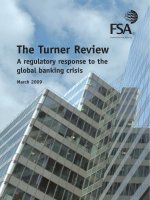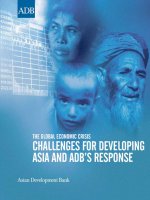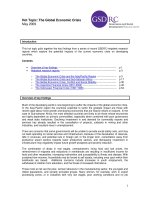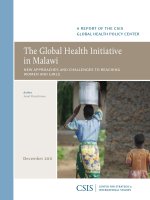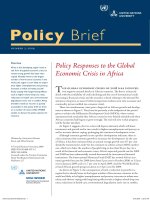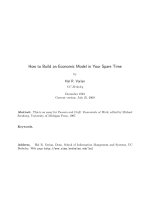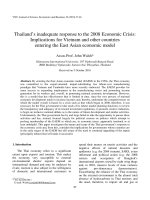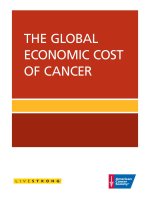Policy Responses to the Global Economic Crisis in Africa pot
Bạn đang xem bản rút gọn của tài liệu. Xem và tải ngay bản đầy đủ của tài liệu tại đây (716.48 KB, 8 trang )
Policy Responses to the Global Economic Crisis in Africa 1
www.wider.unu.edu
Policy Responses to the Global
Economic Crisis in Africa
T
two negative external shocks in African countries. e first is a financial
shock with the availability of credit declining and the cost of international credit
increasing (a financial crisis); and the second is a shock relating to the demand for
and price of exports, as most of Africa’s important markets went into recession and
commodity prices tumbled (an economic crisis).
ese two simultaneous crises pose a huge risk to African growth and develop-
ment as shown in Figure 1. ey have hit precisely at the midpoint of the period
given to achieve the Millennium Development Goals (MDGs), when various
assessments had concluded that African countries were behind schedule and when
African countries had begun to grow strongly. e real risk now is that progress
will be further derailed.
As Figure 1 suggests, the two crises will depress demand, which will lower
investment and growth and in turn result in higher unemployment and poverty as
well as increase adverse coping, prolonging the continent’s development crisis.
Although economic growth is not a perfect development indicator, there is
a fair consensus that economic growth is necessary for development. In the case
of Africa, it has been estimated that an annual average growth rate of 7 per cent
should be maintained in order for the continent to achieve at least MDG number
one, which is to halve the number of people living on less than $1 per day. As a
result of the financial and economic crises, Africa’s expected growth rate for 2009
and 2010 has been substantially revised downwards by international financial
institutions. e International Monetary Fund (IMF) has revised Africa’s eco-
nomic growth forecasts for 2009 down from 5 per cent in October 2008, to 3.5 per
cent in January 2009, and to 1.7 per cent in April 2009. And the World Bank has
revised African growth prospects down to 2.4 per cent for 2009.
As shown in Figure 1, the consequences of such a reduction in growth in a
region that is already home to the largest number of low-income countries in the
world are likely to be higher unemployment and poverty; increases in infant mor-
tality; and adverse coping with long-lasting effects such as higher school drop-out
rates, reductions in health care, environmental degradation and a rise in conflict.
Overview
Africa is the developing region most at
risk from the global economic crisis. Its
recent strong growth has been inter-
rupted. Already home to the largest
number of low-income countries in the
world, the region is now likely to experi-
ence higher unemployment and poverty;
increases in infant mortality; and dif-
culty coping with longer-lasting effects
such as higher school drop-out rates,
reductions in health care, environmental
degradation and a rise in conict. Africa
therefore needs to recover as quickly
as possible. In this policy brief we draw
on a number of recent UNU-WIDER
studies to discuss the policy options for
recovery.
Written by A K
F and W N
© United Nations University, 2009
ISBN 978-92-808-3071-2
ISSN 1814-8026
Licensed under the Creative Commons
Deed “Attribution-NonCommercial-
NoDerivs 2.5”
,
2185 Policy Brief 09-03(Web).indd 1 8/31/2009 1:32:01 PM
2 Policy Brief
www.unu.edu
Africa therefore needs to recover as
quickly as possible. What are the policy
options for such recovery? In this pol-
icy brief we draw on a number of recent
UNU-WIDER studies (see About this
Policy Brief) to address this question.
Policy Responses
How much Africa is at risk from the
above crisis will depend on how vul-
nerable its countries are and also how
resilient they are. Vulnerability in this
case depends on how exposed coun-
tries are to adverse changes in global
finance and trade. is may be largely,
at least over the short-term, outside of
their control. Resilience refers to the
capacity to cope with adverse shocks,
and may depend on a country’s macro-
economic management, institutions
and leadership: aspects which are pri-
marily under a country’s control. Mini-
mizing the risk of the global economic
crisis therefore means addressing both
vulnerability and resilience. e global
community as well as African countries
will need to act in this regard, specifi-
cally in terms of mitigating the impact
of the shocks (here the international
community should assume a larger
responsibility); coping with the effects
of the crisis (here African countries
will have to bear the brunt); and reduc-
ing risk by instituting proper measures
to limit vulnerability and build resil-
ience over the longer-term (with both
countries and the international com-
munity playing a role).
e various policy responses under
the categories (i) mitigation, (ii) cop-
ing and (iii) risk reduction are sum-
marized in Table 1. Note that these
are generic policy responses and would
need to be adjusted to the context of
each individual country to allow for
different circumstances. However, we
do not have the space here to consider
the most appropriate responses at indi-
vidual country level and can thus only
discuss a number of generic actions and
considerations.
Mitigation measures, to be under-
taken by both the international com-
munity and African countries,
include:
■ Monitoring the impact of the crisis;
■ Restoring confidence in, and con-
tinuing to monitor and regulate
banks;
■ Expanding trade (also through aid-
for-trade programmes) and avoiding
creeping protectionism; and
■ Expanding trade finance.
Of the foregoing measures, the
expansion of trade is perhaps the most
crucial, as much of the adverse shock
to Africa and the Least Developed
Countries (LDCs) is due to a decline in
exports. Expanding trade is, however,
largely dependent on the international
community. Here, first of all, efforts
undertaken to restore growth in the
advanced economies are vital. e
sooner industrialized countries recover,
the better for Africa. Moreover, this
needs to be done without resorting to
protectionism, now identified as a haz-
ard to global trade. Efforts to expand
trade finance through regional mul-
tilateral financial institutions such as
the African Development Bank, for
Figure 1: Impact of the Financial and Economic Crises on African Growth and Development
Source: e authors
2185 Policy Brief 09-03(Web).indd 2 8/31/2009 1:32:01 PM
Policy Responses to the Global Economic Crisis in Africa 3
www.wider.unu.edu
instance, could complement trade-
for-aid programmes by donors and
enable preferential trade access for
African products.
e role of African governments in
mitigation would be to:
■ Monitor the impact of the crisis;
■ Monitor and regulate their own
banking systems and check
for early signs of bank
difficulties;
■ Maintain or promote a positive
stance towards trade liberalization
and open markets;
■ Lobby for a satisfactory conclusion
of a more appropriate, development-
oriented Doha Round;
■ Work towards improving the sup-
ply capacity of African countries,
for instance through public works
programmes targeted towards infra-
structure and transport services; and
■ Maintain competitive real exchange
rates and encourage further regional
integration and regional trade facili-
tation measures.
Coping actions, largely the respon-
sibility of individual countries but
supported by assistance from donors,
would include:
■ Expanding domestic demand
through fiscal and monetary stimuli,
where possible, in a manner that
does not lead to unsustainable debt
accumulation;
■ Absorbing financial losses through
establishing foreign reserves in coun-
tries with means and competitive
exchange rates;
■ Supporting the vulnerable through
appropriate social safety nets with
the help of aid;
■ Expanding self-employment, for
example, by making the business
environment more accessible and
through public works programmes;
■ Utilizing technical assistance in the
design and implementation of pro-
grammes, and
■ Expanding peacekeeping operations
where needed, given the potential for
escalating conflict in times of eco-
nomic hardship.
e international community’s
role in mitigation measures is to facili-
tate the demand for Africa’s exports,
which is a general and cross-cutting
task. Whereas, in measures designed
to help countries cope with the effects
of the crisis, the international com-
munity needs to be more alert to
country-level differences. is is where
it is important to be able to identify
countries most at risk, and to ensure
that assistance is tailored to specific cir-
cumstances. Such assistance would be
twofold: assisting African governments
with financial resources so as to allevi-
ate poverty and maximize the level of
such aid’s effectiveness (ascertaining
that aid is appropriately utilized and
that it does not divert local produc-
tion); and providing technical assis-
tance or even peacekeeping operations,
if necessary. African governments, in
turn, should take care that expansion-
ary policies do not lead to unsustain-
able budget deficits or debt burdens,
and that the appeal of private sector
activity is improved.
Finally, as indicated in Table 1,
African countries need to reduce risk;
it is not enough to merely mitigate risk
or cope with risk. Given the nature
of the crisis, this implies that what is
required is diversification of economies,
improvement of the environment to
enable successful business, and reform
The sooner industrialized countries recover, the better for Africa
About the Authors
Augustin Kwasi Fosu is deputy-
director, UNU-WIDER
Wim Naudé is senior research
fellow, UNU-WIDER
2185 Policy Brief 09-03(Web).indd 3 8/31/2009 1:32:02 PM
4 Policy Brief
www.unu.edu
of the global financial and aid architec-
ture. ere is an important role for the
international community here as well.
Many African economies currently
face a major problem with diversifica-
tion, in part because their manufactur-
ing capacity is being eroded by cheap
imports, mainly from other developing
countries. African countries must, of
course, improve their competitive-
ness through infrastructure improve-
ment, inter alia. In the meantime,
however, they should also be allowed
policy space under the World Trade
Organization (WTO) to temporarily
limit such imports. In all of these rec-
ommendations, the strengthening of
governance is a prerequisite. e good
news is that many countries in Africa
have over the past decade, on average,
improved governance through institu-
tional reform, but it is also true that
many others are still lagging behind.
An important concern for a number
of these countries is that such reform
can be fraught with potential political
disorder, requiring appropriate
support to be given in order to reduce
the likelihood of conflict. Conversely,
we must also be cognizant of the need
to preserve the achievements of the
countries that have succeeded with
reforms. is requires appropriate
support to reduce the potential for
political opportunism during crises,
which could reverse the success
achieved to date. Some of Africa’s
high-risk countries fall into this
category.
Finally, stronger domestic gov-
ernance in Africa will go a long way
towards complementing improved
international governance of the
global economic and financial systems.
is complementarity, in turn, will
contribute to longer-term economic
development.
Table 1: Mitigation, Coping and Risk Reduction Policies
Objectives Action
MITIGATION ACTION
Restore nancial condence
Expand trade
Expand nance
• Monitoring, supervision and regulation of
nancial institutions
• Recapitalization of banks where needed
• Avoid protectionism
• Maintain competitive exchange rate
policies
• Obtain balance-of-payments support
• Obtain trade nance support
• Aid-for-trade
• Increase aid and accelerate aid
disbursement
• Attract foreign direct investment (FDI)
• Facilitate remittances
• Stop and return illicit funds/ight capital
COPING ACTION
Expand domestic demand
Absorb nancial losses
Expand self-employment
Technical assistance
Peacekeeping
• Undertake public works programmes
• Prevent unemployment escalating
• Provide social security, e.g. cash transfers,
school feeding programmes
• Consider tax reductions
• Draw down reserves and utilize short-
term international nancial assistance
• Relax business regulations
• Obtain assistance in planning and
co-ordinating responses
• Ensure the targeting and distribution of
assistance
• Provide information and monitor the
impact
• Monitor violent conict
• Address grievances
• Contain violence and spillovers
• Plan for displacements and migrations
RISK REDUCTION STRATEGIES
Export and production
diversication
Banking system strengthening
and nancial deepening
• Expand South-South trade
• Promote manufacturing (e.g., through
agro-industries)
• Promote tourism
• Invest in infrastructure
• Expand access to nance
• Encourage nancial innovation
• Maintain adequate bank capital
requirements
• Encourage domestic banking expansion
2185 Policy Brief 09-03(Web).indd 4 8/31/2009 1:32:02 PM
Policy Responses to the Global Economic Crisis in Africa 5
www.wider.unu.edu
Pitfalls in Policy Responses
is is not the first time that African
countries have had to respond to nega-
tive external shocks. Looking at
African countries’ past records, it is
clear that there exist certain pitfalls to
be avoided in the selection and imple-
mentation of policies.
Boom-and-bust cycles
e current contraction in African
growth comes after a period of high
growth, and in fact follows the conti-
nent’s post-war record of boom-and-
bust episodes, a record that has been
detrimental to growth over the longer
term. us another boom-bust cycle
should be avoided. at means the
pursuit of prudent fiscal and monetary
policies in order to forestall subsequent
fiscal difficulties. Despite the down-
turn, Africa is in general not expected
to enter into recession, and may have
increased resilience for recovery suf-
ficiently enough to avoid an unsustain-
able boom.
Unsustainable debt
Generating another debt crisis is a
grave danger. e continent’s boom-
and-bust cycles of the past have often
been accompanied by episodes of sov-
ereign indebtedness, snaring many
African countries and LDCs into a
debt trap in the 1980s and 1990s.
While many of these nations have
benefitted from the Heavily Indebted
Poor Countries (HIPC) initiative
and the Multilateral Debt Relief Ini-
tiative (MDRI), the current crisis is
likely to put pressure on both devel-
oping country expenditure (given the
global calls for fiscal expansion) and
revenue (due to a decline in tax income
declines as a result of a reduction in
trade and economic activity), with the
likelihood of increased debts. As sov-
ereign bond issues become more dif-
ficult and expensive due to the global
credit crunch, many countries may
be tempted to increase lending from
regional banks and the Bretton
Woods institutions. Unsustainable
debts and irresponsible lending are
hazards to be avoided. Preventing
another debt crisis may require deeper
African governments should take care that expansionary policies
do not lead to unsustainable budget decits or debt burdens
Table 1: (continued)
Objectives Action
Social cohesion
Good governance and
institutional development
Reform of international
nancial architecture
• End conicts/promote peace
• Participatory and inclusive governance
• Protect minorities
• Nation-building
• Build strong and effective governments
• Strengthen basic institutions, i.e. property
rights, rule of law, contract enforcement,
independent judiciary
• Give a greater voice to Sub-Saharan Africa
(SSA)
• Advance the Doha Round, with more
development content
• Reform Bretton Woods institutions
• More development role for G-20
• Reform aid architecture: volume and
effectiveness
• Address global imbalances
Source: Augustin Kwasi Fosu and Wim Naudé (2009), The Global Economic
Crisis: Towards Syndrome-Free Recovery for Africa, UNU-WIDER Discussion
paper, DP2009/03.
2185 Policy Brief 09-03(Web).indd 5 8/31/2009 1:32:02 PM
6 Policy Brief
www.unu.edu
debt cancellation, as well as greater
efforts to improve domestic resource
mobilization.
Adverse coping
A considerable challenge in the face
of this crisis is preventing house-
holds from engaging in adverse cop-
ing strategies. ere is a risk that the
most vulnerable will be left to fend for
themselves, and that inequality and
polarization will increase, threatening
stability. erefore, what is required
in Africa is not just fiscal stimuli, but
also government expenditure that is of
the right type and is specifically tar-
geted. Indeed, it may be argued that
now is an opportunity for many coun-
tries to implement and/or strengthen
their social safetynets. Safety net pro-
grammes should include unconditional
as well as conditional cash transfers
to poor households, and public works
programmes.
In addition, where resources per-
mit, expenditures related to public
works such as trade and transport
infrastructure should be increased.
is would not only offer relief by
creating short-term jobs, but would
also contribute to improving pro-
duction capacity in the economy by
strengthening needed infrastructure.
In the past, investment expenditures
were often substantially reduced during
crises, delaying recovery and depressing
longer-term growth.
Reversing liberalization
A third hazard that needs to be avoided
by African countries in responding to
the crisis is the reversal of gains made
in recent years through economic
liberalization. Many countries may
contemplate the reintroduction of crip-
pling state controls, prohibitively high
tariffs and inefficient sectoral subsidies.
While these may provide short-term
relief, they may also return African
countries to counter-productive poli-
cies in the form of anti-growth ‘policy
syndromes’ in the longer term.
Many African countries have some
scope within the WTO to apply safe-
guard mechanisms to provide, amongst
others, credit to domestic firms and
to engage in government procurement
programmes to stimulate the domestic
economy. But we caution against the
return to the ‘bad old days’ of prolifer-
ating rent-seeking opportunities. How-
ever, we also recognize that the WTO
itself needs reform so that it provides
a wider policy space for low-income
countries; this reform should be an
About this Policy Brief
This policy brief is published as part of UNU-WIDER’s ongoing work on the
global economic crisis within its project ‘New Directions in Economic Devel-
opment’ directed by Augustin Kwasi Fosu. More detailed ndings are set out
in a series of WIDER research papers and WIDER Angle Newsletter articles
(available to download free at www.wider.unu.edu):
Wim Naudé (2009), The Financial Crisis of 2008 and the Developing Countries,
UNU-WIDER Discussion paper, DP2009/01.
Augustin Kwasi Fosu and Wim Naudé (2009), The Global Economic Crisis:
Towards Syndrome-Free Recovery for Africa, UNU-WIDER Discussion paper,
DP2009/03.
Augustin Kwasi Fosu and Wim Naudé (2009), Africa’s Recovery from the Global
Economic Crisis, WIDER Angle, June 2009.
Imed Drine (2009), Impact of the Global Economic Crisis on the Arab Region,
WIDER Angle, June 2009.
Wim Naudé and James C. MacGee (2009), Wealth Distribution, the Financial
Crisis and Entrepreneurship, WIDER Angle, March 2009.
Strengthening of governance is a prerequisite
2185 Policy Brief 09-03(Web).indd 6 8/31/2009 1:32:03 PM
Policy Responses to the Global Economic Crisis in Africa 7
www.wider.unu.edu
important aspect of the longer-term
responses to reduce the risks for
African nations.
Concluding Remarks
It is not only up to African countries
themselves to avoid pitfalls in policy
responses to the crisis. Advanced coun-
tries also have the responsibility to fix
the global financial system and to equi-
tably address the harm already done.
Will African governments be able
to sidestep pitfalls and will the inter-
national community be able to suffi-
ciently reform the global financial and
aid architecture? We are optimistic,
for unlike in the 1970s governance and
political contestability have improved
significantly across the continent.
ere is also the urgency in the world
economy — perhaps unlike any other
time in the past — to reform global
institutions. e UN Conference on
the World Financial and Economic
Crisis and Its Impact on Development
(held in New York, 24-30 June 2009)
again emphasized the need for such
reform. ere is, therefore, an oppor-
tunity to align Africa’s development
needs even closer to those of the global
economy, and to herald in a new era
in multilateral development
co-operation.
What is required in Africa is not just scal stimuli, but also
government expenditure that is of the right type and is
specically targeted
2185 Policy Brief 09-03(Web).indd 7 8/31/2009 1:32:03 PM
8 Policy Brief
www.unu.edu
United Nations University
World Institute for Development
Economics Research
Katajanokanlaituri 6 B FIN-00160
Helsinki
Finland
www.wider.unu.edu
I N S I D E :
Policy Brief
‘Policy Responses to
the Global Economic
Crisis in Africa’
Africa is the developing
region perhaps most at risk
from the global economic
crisis and in need of quick
recovery. is policy brief
draws on a number of recent
UNU-WIDER studies to
discuss the policy options
for recovery.
UNU World Institute for Development Economics Research (UNU-
WIDER) is a research and training centre of the United Nations
University. UNU-WIDER was established by the United Nations
University (UNU) as its rst research and training centre and
started work in Helsinki, Finland in 1985. The Institute undertakes
applied research and policy analysis on structural changes affecting
the developing and transitional economies, provides a forum for the
advocacy of policies leading to robust, equitable and environmentally
sustainable growth, and promotes capacity strengthening and training in
the eld of economic and social policy making. Work is carried out by
staff researchers and visiting scholars in Helsinki and through networks
of collaborating scholars and institutions around the world.
www.unu.edu
www.wider.unu.edu
2185 Policy Brief 09-03(Web).indd 8 8/31/2009 1:32:03 PM
